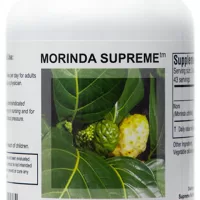Hashimoto’s disease is the most common cause of hypothyroidism in the United States, affecting approx. 5 in 10 people (Source). Women are particularly more at risk to develop the autoimmune disease because of the hormonal changes during or after pregnancy and menopause. Often closely linked to gut health, a holistic approach to restoring thyroid health including natural diet and lifestyle changes is recommended.
Learn more about Hashimoto’s disease, its symptoms, treatment, and natural remedies in the article below.
What is Hashimoto’s Thyroiditis?
What is Hashimoto’s Thyroiditis? Hashimoto’s thyroiditis, also known as Hashimoto’s disease or lymphocytic thyroiditis, is an autoimmune disorder in which antibodies cause inflammation and injury to the thyroid gland.
The thyroid, a small, butterfly-shaped gland in the front of your neck, controls how your body uses energy by secreting thyroid hormones into your blood. To produce its hormones, the thyroid uses iodine from the food you eat. Triiodothyronine (T3) and Thyroxenine (T4), the two primary thyroid hormones, travel in your bloodstream to reach nearly every cell in your body. They regulate how fast and efficiently cells convert nutrients into energy – a process called metabolism.
The thyroid regulates many of your body’s vital functions, such as:
- Breathing
- Heart Rate
- Body Weight
- Muscle Strength
- Body Temperature
- Central and Peripheral Nervous Systems
With an autoimmune thyroid disease like Hashimoto’s, your immune system attacks your thyroid gland. Interfering with its ability to produce thyroid hormones and function properly. As a result, many of your body’s important functions slow down, sometimes drastically.
Hashimoto’s Disease Symptoms
Hashimoto’s Disease typically progresses very slow, people with Hashimoto’s thyroiditis don’t have any symptoms early on. Over time, Hashimoto’s disease causes chronic cell damage leading to the development of an enlarged thyroid, called a goiter. An enlarged thyroid can cause the front of your neck to look swollen and may create a feeling of fullness in your throat. Patients will gradually develop symptoms of hypothyroidism, an underactive thyroid gland.
Hashimoto’s disease is the most frequent cause of hypothyroidism and common symptoms and warning signs include:
- Tiredness and fatigue
- Depression and anxiety
- Weight gain
- Joint and muscle aches
- Constipation and other digestive issues
- Hair loss or hair thinning
- Rough, dry skin
- Increased sensitivity to cold
- Slower heart rate
- Trouble breathing
- Decreased sex drive or dexual dysfunction
- For women: irregular menstrual cycles
Older patients or patients who remain untreated may be at a risk to develop other health problems including (Source):
- Infertility and ovarian failure
- Addison’s disease or Grave’s disease
- Type 1 diabetes
- Rheumatoid arthritis
- Lupus erythematosus (A disorder that causes inflammation in a number of the body’s systems, including the lungs and heart)
- Thrombocytopenic purpura (A disorder that interferes with the blood’s ability to clot)
What Causes Hashimoto’s Disease and Am I at Risk?
There are several root causes that can lead to the development of an autoimmune disorder. They are not the single determining factor, however, your genes can play a role in your body’s susceptibility to Hashimoto’s thyroiditis. Other factors may be your diet, environmental influences, stress, hormone levels, and gut health.
Gut health
For starters, Gut health in particular plays an important role in regulating your immune system. An imbalance of gut flora can trigger your immune system to start attacking your thyroid and develop a thyroid disorder. An example being, research has long suggested a strong link between celiac disease and thyroid problems (Source).
Gluten is a well-known trigger of intestinal permeability, i.e. leaky gut syndrome. A leaky gut allows bacteria and toxins to enter the bloodstream, which can cause immune responses and inflammation.
Another contributing factor to the development of Hashimoto’s disease is chronic stress (Source). Research has shown that chronic stress can cause immune dysregulation, exacerbate inflammation, and slow down your thyroid functions.
Nutritional insufficiencies
Nutritional insufficiencies play a large role in the production of thyroid antibodies. Women in particular oftentimes suffer from iodine and other nutritional deficiencies, which can lead to hypothyroidism, goiter, and other growth and developmental abnormalities (Source). Low zinc, vitamin D, vitamin A, and selenium all have been associated with the development of Hashimoto’s disease.
The main causes for Hashimoto’s disease:
- Leaky gut syndrome and other digestive issues
- Allergies and intolerances, e.g. to gluten and dairy
- Stress
- Nutrient deficiencies
Other risk factors include (Source):
- Other autoimmune disorders: Having another autoimmune disorder increases the risk of developing Hashimoto’s disease.
- Genetics: If thyroid disorders run in your family, you are more likely to develop thyroid issues yourself.
- Your gender: Being a woman puts you at a higher risk for Hashimoto’s disease. Researchers believe sex hormones to play a large role. Furthermore, women oftentimes develop thyroid issues after giving birth or during menopause due to the changes in their estrogen level.
- Your age: The chances of developing Hashimoto’s disease increase with age. The risk is even higher for women over the age of 60, whose symptoms may closely mimic symptoms of menopause.
- Bacterial Infections: Much like other autoimmune diseases, Hashimoto’s disease may be triggered by a number of parasitic, yeast, and fungal infections
- Radiation exposure: The thyroid disease is common in people exposed to a high level of radiation, e.g. in cancer treatments or nuclear events
How is Hashimoto’s Disease Diagnosed?
Doctors test for Hashimoto’s thyroiditis when patients are exhibiting the symptoms mentioned above. These symptoms are often accompanied by an enlarged thyroid gland. Next, your doctor will take blood tests that measure levels of thyroid hormones and thyroid-stimulating hormone (TSH).
In the past, it was nearly impossible to detect an under-active thyroid until the symptoms were fairly advanced. However, with current technology, doctors are able to diagnose Hashimoto’s as well as other thyroid diseases much earlier, some even before the patient experiences any symptoms.
Conventional Treatments for Hashimoto’s Disease
Depending on the patient’s TSH levels, doctors may suggest to just “wait and see” whether or not it is necessary to prescribe medication. Patients with elevated TSH levels and low T3 and T4 levels are typically prescribed a thyroid hormone replacement (Levoxyl, Synthroid, etc.).
While hormone replacements succeed in restoring normal thyroid hormone levels, they do not address the underlying problems that caused the autoimmune disease in the first place. Making a holistic approach highly recommended to restore immune health and reduce the symptoms of Hashimoto’s disease.
Natural Remedies for Thyroid Health
Whether you’re going the traditional route and taking thyroid hormones or not, these natural remedies can help. By reduce your symptoms, restoring a healthy gut, and most importantly helping you take back your health.
Eliminate Food Triggers and Heal Your Gut
Because gut health is one of the most important contributing factors to developing a thyroid disease, we must restore a healthy gut, start an elimination diet and avoid inflammatory food triggers. Although it may be challenging at first, but by going gluten-, or even better, completely grain-free you can help improve your digestive health. Targeted supplementation can lower autoimmune reactions and accelerate gut healing.
Reduce Stress
Scientific evidence strongly suggests that stress reduction interventions can have a positive therapeutic effect in autoimmune disease patients (Source). Reduce stress through regular exercise, meditation, yoga, and getting enough sleep.
Use Supplements
There are several supplements that have been proven to lower autoimmune reactions and regulate immune health.
Selenium
Selenium has been shown to improve thyroid function and TSH levels. Moreover, selenium can lower the risk for developing thyroiditis during or shortly after pregnancy (Source). A 2002 study published by the Journal of Clinical Endocrinology and Metabolism indicated how even a mild selenium deficiency can contribute to the development and maintenance of autoimmune thyroid diseases (Source).
Zinc
In combination with selenium supplements, zinc has been proven to have a positive effect on thyroid function in those with Hashimoto’s disease. A 2015 study reported a significant decrease in TSH and an increase in T4 levels in hypothyroid patients that took both Zinc and Selenium (Source).
Vitamin D
Evidence suggests that there is a strong link between vitamin D deficiency and thyroid diseases (Source). Vitamin D has a remarkable effects on your immune health and a supplementation of vitamin D3 can help to improve your thyroid function.
Probiotics
If Hashimoto’s disease is caused by leaky gut syndrome or other digestive issues, supplementing with probiotics can help to restore gut health. Found naturally in fermented foods such as kimchi, sauerkraut, or yogurt, the healthy bacteria work with your body to improve immunity, digestion, and more.
Have you been diagnosed with Hashimoto’s disease or are experiencing one or more of the symptoms mentioned above? Call us at (480) 991-5555 to schedule an appointment. We’ll be happy to help you develop a step by step plan to take back your health and restore normal thyroid function.
Keywords: Hashimoto’s, Hashimoto’s Disease, Hashimoto’s Thyroiditis, Hashimoto’s Natural Treatments, Natural Remedies for Hashimoto’s, Natural Remedies for Thyroid Health
Sources:





